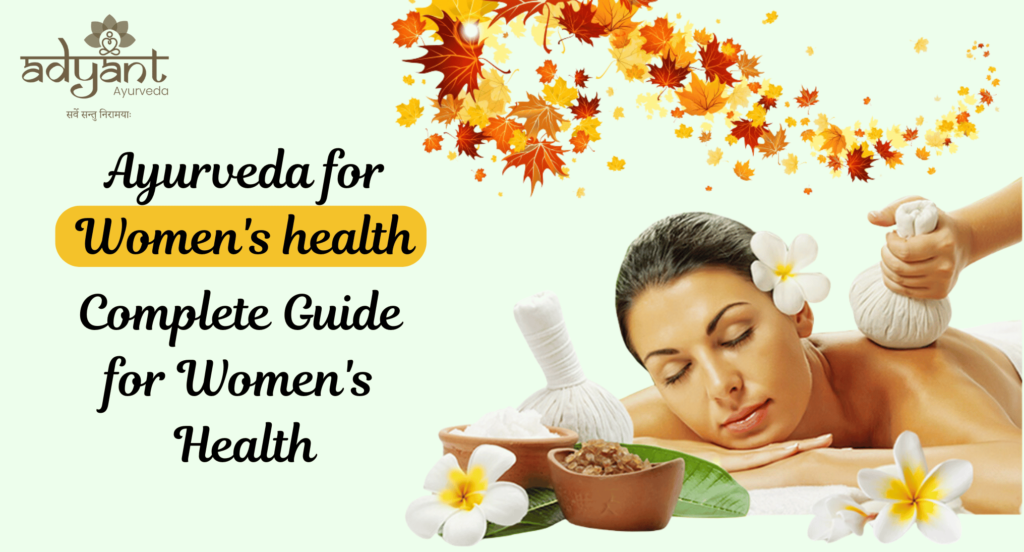Ayurveda for Women’s Health: A Holistic Approach to Well-Being
For centuries, Ayurveda has provided a profound and holistic approach to health, emphasizing harmony between the body, mind, and spirit. Women’s health, in particular, benefits greatly from Ayurvedic principles, which address the unique physiological, hormonal, and emotional needs of the feminine form.
In today’s fast-paced world, women juggle multiple roles, often neglecting their well-being. Ayurveda offers a way to restore balance, enhance vitality, and empower women to take charge of their health naturally. Through tailored diet, lifestyle changes, herbal remedies, and therapeutic practices, Ayurveda helps women achieve optimal health at every stage of life.
For a free consultation with top ayurvedic doctors on women’s health, download our app from the Play Store, “AyurCare“
Table of Contents
ToggleHonoring the Feminine Cycle: Ayurveda and Menstrual Health
Ayurveda recognizes the menstrual cycle as a vital process reflecting a woman’s overall health. Each phase of the cycle is governed by different doshas:
- Vata Phase (Menstrual phase): Light, dry, and cold qualities dominate. Women may experience cramps, fatigue, and anxiety. Ayurveda recommends warm, nourishing foods like soups and herbal teas with ginger and cinnamon to ease discomfort.
- Pitta Phase (Follicular phase): Increased metabolism and energy require cooling and hydrating foods like coconut water and cucumber to balance heat.
- Kapha Phase (Luteal phase): A time of fluid retention and emotional sensitivity. Ayurvedic practices like abhyanga (self-massage) with warm sesame oil help maintain balance.
Ayurvedic Recommendations for Menstrual Health:
- Herbs like Shatavari, Ashoka, and Lodhra support hormonal balance.
- Gentle yoga and meditation to relieve stress and cramps.
- Avoid processed foods and excessive caffeine to reduce PMS symptoms.
Read Also: Ayurvedic Doshas: Vata, Pitta, Kapha
Ayurvedic Diagnostics
A cornerstone of effective Ayurvedic treatment lies in personalized diagnosis.
Key Diagnostic Tools:
-
Nadi Pariksha (Pulse Diagnosis): Helps detect dosha imbalances, metabolic strength, and hidden disorders.
-
Prakriti Analysis: Determines your innate constitution (Vata, Pitta, Kapha), guiding diet, lifestyle, and treatments tailored for you.
Integrating these tools ensures that no two treatments are alike, allowing for deeply individualized care.
Integrating Ayurveda with Modern Diagnostics
Ayurveda complements modern medicine beautifully. While Ayurveda emphasizes root-cause treatment, modern diagnostics help track progress and refine accuracy.
Examples of Integration:
-
Ultrasound for PCOD or endometriosis.
-
Hormone profile tests for menopause or thyroid imbalance.
-
Blood sugar and lipid profiles during Ayurvedic diabetes treatment.
-
Bone density scans for osteoporosis monitoring.
This integrative approach enhances safety, efficacy, and patient confidence.
Supporting Women’s Health Across Life Stages
Ayurveda uniquely supports women through every life transition—from puberty to menopause—by focusing on preventive care, natural remedies, and individualized treatments. Each stage of life is influenced by different doshas, and balancing them ensures long-term well-being.
-
Childhood & Adolescence (Kapha stage): Emphasizes immunity-building herbs like Guduchi and enhancing metabolism with light, warm foods.
-
Reproductive Years (Pitta stage): Focuses on hormonal regulation, emotional balance, and fertility enhancement through diet, herbs, and lifestyle.
-
Menopause & Beyond (Vata stage): Encourages grounding routines, nourishing foods, and rejuvenating therapies to maintain strength and vitality.
Promoting Reproductive Health
Ayurveda provides comprehensive guidance for all reproductive phases, from preconception to postpartum care:
1. Ayurvedic Preconception Care (Garbhadhan Samskara)
- Detoxification through Panchakarma to purify the body.
- Herbal tonics like Ashwagandha and Bala for vitality.
- A sattvic diet rich in ghee, milk, and nuts to boost fertility.
2. Ayurvedic Pregnancy Care
- Prenatal massages (Garbhini Abhyanga) with soothing oils like Bala Taila.
- Herbal formulations such as Draksharishta and Satavari Kalpa to nourish the mother and baby.
- Practicing Pranayama and meditation to ensure emotional stability.
3. Postpartum Care (Sutika Paricharya)
- Special diets, including dashamoola tea and ajwain water, to aid recovery.
- Abhyanga with Dhanwantharam oil to strengthen muscles.
- Ayurvedic lactation support with Shatavari and fenugreek.
Read Also: Ayurvedic Oil Massage (Abhyanga)
Ayurvedic Self-Care Rituals for Women
Self-care is not a luxury in Ayurveda—it is a daily ritual to maintain balance, health, and emotional well-being. Simple, consistent practices can deeply nourish both body and mind.
-
Dinacharya (Daily Routine): Establish a regular sleep-wake cycle, perform Abhyanga (self-massage), and follow a mindful diet suited to your dosha.
-
Rasayana (Rejuvenation Therapy): Seasonal use of rejuvenating herbs like Amalaki, Shatavari, and Ashwagandha to promote longevity and vitality.
-
Yoni Prakshalana: Gentle vaginal cleansing using decoctions of Triphala or neem for maintaining reproductive hygiene.
Ayurvedic Remedies for Common Women’s Health Issues
Ayurveda offers effective natural solutions for conditions that commonly affect women. These remedies focus on correcting imbalances at the root level and restoring harmony.
-
Leucorrhea: Herbal powders of Lodhra, Ashoka, and Yashtimadhu with honey. Vaginal douching with Triphala decoction.
-
Dysmenorrhea (Painful Periods): Warm castor oil packs on the abdomen, infusion of ginger and fennel, and light Abhyanga during menstruation.
-
UTIs (Urinary Tract Infections): Cooling herbs like Chandana (sandalwood), Gokshura, and coconut water. Panchakarma therapies may be recommended for chronic cases.
Ayurveda for Menopause: A Graceful Transition
Menopause is a natural phase, yet many women experience discomfort due to hormonal changes. Ayurveda provides a holistic approach:
Common Menopausal Symptoms and Ayurvedic Remedies
- Hot flashes: Cooling herbs like Shatavari, Brahmi, and Guduchi.
- Mood swings: Adaptogenic herbs like Ashwagandha and Jatamansi.
- Osteoporosis risk: Sesame seeds, ghee, and Dashamoola to strengthen bones.
Lifestyle Adjustments:
- Daily Abhyanga with sesame or coconut oil to maintain skin and joint health.
- Light yoga and meditation to balance emotional changes.
- Panchakarma therapies like Virechana are used for detoxification and hormone regulation.
Read also: Ayurveda for menopause
Addressing Hormonal Imbalances (PCOS, Thyroid, and More)
Hormonal imbalances are increasingly common due to stress, diet, and lifestyle choices. Ayurveda targets the root cause through:
1. PCOS (Polycystic Ovarian Syndrome)
- Detoxification therapies like Udwartana (herbal powder massage).
- Herbs such as Kanchanar Guggulu and Chandraprabha Vati.
- A Pitta-Kapha balancing diet with less dairy and refined carbs.
2. Thyroid Disorders
- Guggulu, Ashwagandha, and Triphala for metabolic balance.
- A mindful diet rich in iodine sources like seaweed and rock salt.
- Daily Nasya therapy with Anu Taila to stimulate thyroid function.
Read Also: Ayurvedic Treatment for Irregular Periods
Nurturing Emotional and Mental Well-being
Mental and emotional well-being are integral to Ayurvedic health. Common issues like stress, anxiety, and depression can be managed through:
1. Ayurvedic Herbs for Mental Clarity & Stress Relief
- Brahmi & Shankhpushpi – Enhance cognitive function.
- Ashwagandha & Jatamansi – Reduce cortisol and anxiety.
- Sarpgandha – Helps regulate sleep and calm the mind.
2. Ayurvedic Therapies for Mental Well-being
- Shirodhara (warm oil therapy) to reduce mental fatigue.
- Nasyam (nasal oil application) to calm the nervous system.
- Meditation and Pranayama for emotional balance.
Read Also: Ayurvedic Treatment for Stress and Anxiety
Ayurveda for Breast Health
Ayurveda emphasizes the health of Stanya (breast tissue) as a vital part of women’s well-being. Imbalances in Kapha or improper lymphatic drainage can lead to stagnation or tenderness in the breast region.
Ayurvedic Tips for Breast Health:
-
Herbs & Foods:
-
Turmeric: Anti-inflammatory, prevents cyst formation.
-
Flaxseeds: Rich in lignans and omega-3s, they promote hormonal balance.
-
Shatavari: Supports lactation and strengthens breast tissue.
-
-
Self-Abhyanga (Oil Massage):
-
Regular gentle breast massage with warm oils (like sesame or castor oil infused with herbs) enhances lymphatic circulation, tones tissues, and promotes detoxification.
-
Particularly beneficial postpartum or post-menopause to prevent sagging and fibrosis.
-
Ayurveda for Infertility Management
Ayurveda offers holistic and effective solutions for infertility, even in cases where conventional treatments may not succeed.
Commonly Addressed Issues:
-
Tubal Blockage
-
Endometriosis
-
PCOD/PCOS
-
Low AMH levels
-
Unexplained Infertility
Key Therapies:
-
Uttar Basti: A specialized medicated enema administered through the vaginal route, excellent for uterine cleansing, tubal health, and endometrial regeneration.
-
Nasya & Shirodhara: Calms stress hormones, which often impact fertility.
-
Rasayana Therapy: Rejuvenates reproductive tissues (Artava Dhatu) and boosts ovum quality.
Effective Herbs:
-
Ashoka, Lodhra, Shatavari, and Gokshura are commonly used in tailored formulations.
Read also: Ayurveda for infertility
Bone Health and Osteoporosis Prevention Beyond Menopause
Post-menopausal women face an increased risk of osteoporosis due to declining estrogen. Ayurveda strengthens bone health by targeting Asthi Dhatu (bone tissue) directly.
Ayurvedic Bone Boosters:
-
Hadjod (Cissus quadrangularis): Promotes bone healing and density.
-
Laksha (Laccifer lacca): Strengthens fragile bones.
Diet Tips:
-
Sesame seeds (rich in calcium, magnesium)
-
Drumsticks (Moringa) – excellent for mineral support
-
Cow’s ghee supports the absorption of fat-soluble vitamins
Daily Abhyanga, Surya Namaskar, and exposure to early morning sunlight aid calcium absorption and keep joints supple.
Lifestyle & Seasonal Guidelines (Ritucharya)
Women’s health is deeply affected by seasonal changes. Ayurveda recommends Ritucharya—season-based routines—to maintain balance.
Seasonal Considerations:
-
Vata Season (Winter & Late Fall): Can trigger joint pain, anxiety, and menstrual irregularities.
-
Use warming oils like sesame, eat cooked foods, and practice grounding yoga.
-
-
Pitta Season (Summer): Increases risk of hot flashes, skin rashes.
-
Favor cooling foods like ghee, cucumber, and rose water.
-
-
Kapha Season (Spring): Aggravates weight gain and sluggish metabolism.
-
Emphasize detox, light foods, and herbs like Triphala.
-
Seasonal Detox:
A gentle seasonal Panchakarma cleanse or use of detoxifying herbs like Triphala, Trikatu, or Guduchi can reset the system naturally.
Mental Health & Emotional Well-being
Ayurveda considers mental health integral to women’s wellness, especially during postpartum and hormonal transitions.
Emotional Disorders Addressed:
-
Postpartum Depression
-
PMS & Menstrual Mood Swings
-
Menopausal Mood Imbalances
Healing Approaches:
-
Satvavajaya Chikitsa – Ayurveda’s unique psychological therapy focusing on:
-
Replacing negative emotions with positive thoughts.
-
Strengthening Ojas (vital energy) to combat emotional depletion.
-
-
Medhya Rasayana Herbs – Brahmi, Shankhapushpi, and Jatamansi support memory, calmness, and hormonal harmony.
Therapies like Shirodhara, Takradhara, and Nasya are deeply effective in calming the mind.
Ayurvedic Diet for Women’s Health
A balanced Ayurvedic diet nourishes women’s bodies at every stage of life.
Key Ayurvedic Dietary Guidelines:
- Vata: Warm, moist, and grounding foods like root vegetables and ghee.
- Pitta: Cooling foods like coconut, cucumber, and melons.
- Kapha: Light, dry foods like barley, greens, and spices.
Essential Foods for Women’s Health:
- Flaxseeds & Sesame seeds – Support hormonal balance.
- Turmeric & Ginger – Anti-inflammatory properties.
- Amla & Triphala – Detoxification and immunity boosters.
Ayurvedic Skincare & Beauty for Women
Ayurveda promotes natural skincare that enhances beauty from within.
1. Daily Ayurvedic Skincare Rituals
- Ubtan (Herbal face packs) with turmeric, rose, and sandalwood.
- Kumkumadi Tailam for radiant skin.
- Abhyanga to prevent aging and nourish the skin.
2. Ayurvedic Hair Care
- Bhringraj and Amla oil for hair growth.
- Neem and Hibiscus for scalp health.
- Shiro Abhyanga (head massage) to promote relaxation and hair strength.
Read Also: Ayurvedic Detoxification
Conclusion: Embracing Ayurveda for Women’s Health
Ayurveda offers a time-tested and holistic approach to women’s health, addressing every aspect of well-being—from menstrual health to menopause, emotional balance to beauty care. By integrating Ayurvedic principles, women can reclaim their health naturally, fostering vitality, inner strength, and harmony with nature.
By embracing Ayurveda, women can:
- Balance their hormones naturally.
- Support reproductive health at every stage.
- Nourish their body and mind through diet, herbs, and self-care.
Meet the Best Ayurvedic Lady Doctors in Bangalore
At the heart of women’s wellness lies compassionate, expert care, and Bangalore is home to some of the finest Ayurvedic lady doctors who specialize in women’s health. At Adyant Ayurveda, our dedicated team of female Ayurvedic physicians—including Dr. Shree Lakshmi (Jayanagar), Dr. Sumana Patvardhana (Indiranagar), Dr. Vidya (Kalyan Nagar), and Dr. Preethi Shivakumar (Rajarajeshwari Nagar) – bring years of experience in treating conditions such as PCOD, menstrual disorders, infertility, menopause, and emotional well-being. With a deep understanding of the female body and Ayurvedic principles, these doctors provide personalized care that nurtures, heals, and empowers women at every stage of life
Start your Ayurvedic wellness journey today—Book a consultation with our experts at Adyant Ayurveda!
Get a Free Consultation By Downloading Our App “AyurCare“
You May Also Like:
Ayurvedic Doshas: Vata, Pitta, Kapha
Ayurvedic Treatment For Irregular Periods
Ayurvedic treatment for endometriosis
FAQS on Ayurveda for women’s Health
1. How does Ayurveda address women’s health differently from modern medicine?
Answer:
Ayurveda treats women holistically by considering physical, emotional, hormonal, and spiritual health. Unlike modern medicine, which often focuses on symptom relief, Ayurveda aims to balance the doshas (Vata, Pitta, Kapha), strengthen digestion (Agni), and detoxify the body for long-term well-being.
2. Can Ayurveda help with menstrual irregularities and PMS symptoms?
Answer:
Yes, Ayurveda effectively treats menstrual issues like irregular periods, PMS, and dysmenorrhea using herbs like Shatavari, Ashoka, Lodhra, dietary changes, detox therapies, and stress-relieving practices like Abhyanga and meditation.
3. Which Ayurvedic herbs are best for hormonal balance in women?
Answer:
Key herbs include:
-
Shatavari – for reproductive health and estrogen balance
-
Ashwagandha – for stress and thyroid support
-
Lodhra and Ashoka – for regulating the menstrual cycle
-
Kanchanar Guggulu – for PCOS and fibroid management
4. How does Ayurveda support women during menopause?
Answer:
Ayurveda supports menopause through Vata-pacifying diets, rejuvenating therapies (Rasayana), hormone-regulating herbs (e.g., Shatavari, Brahmi), Panchakarma detox, and lifestyle changes to ease symptoms like hot flashes, anxiety, and insomnia.
5. Is Ayurveda safe during pregnancy and postpartum care?
Answer:
Yes, under expert guidance, Ayurveda offers safe and nurturing care during pregnancy and postpartum through:
-
Garbhini Abhyanga (pregnancy massage)
-
Herbal tonics like Draksharishta and Satavari Kalpa
-
Sutika Paricharya (postpartum recovery rituals)
6. Can Ayurveda help with fertility and conception?
Answer:
Absolutely. Ayurveda enhances fertility through detoxification (Panchakarma), nourishing tonics (e.g., Ashwagandha, Bala), and a sattvic (pure) diet. Garbhadhan Samskara prepares the body and mind for healthy conception.
7. How does diet influence women’s health according to Ayurveda?
Answer:
Diet plays a foundational role. Ayurveda tailors diet based on dosha and life stage. For example:
-
Vata women need warm, grounding foods.
-
Pitta women benefit from cooling foods.
-
Kapha women thrive on light, dry, and spicy foods.
A seasonal, fresh, and dosha-appropriate diet balances hormones, boosts energy, and improves immunity.
8. Are there Ayurvedic remedies for common issues like UTIs and leucorrhea?
Answer:
Yes.
-
UTIs: Treated with cooling herbs like Chandana and Gokshura, and increased fluid intake.
-
Leucorrhea: Managed with Lodhra, Yashtimadhu, Ashoka, and Triphala vaginal washes.
9. What are some daily Ayurvedic self-care practices for women?
Answer:
-
Dinacharya (daily routine) including tongue scraping, Abhyanga (oil massage), and meditation
-
Rasayana therapy with herbs like Amalaki and Shatavari
-
Yoni Prakshalana for reproductive hygiene
These help maintain balance, enhance immunity, and support mental clarity.
10. Can Ayurveda help manage PCOS and thyroid disorders naturally?
Answer:
Yes. Ayurveda offers natural solutions:
-
For PCOS: Panchakarma, diet changes, and herbs like Chandraprabha Vati and Kanchanar Guggulu.
-
For Thyroid: Ashwagandha, Guggulu, Nasya therapy, and an iodine-rich Ayurvedic diet.
11. How does Ayurveda approach weight gain or obesity in women, especially post-pregnancy or menopause?
Answer: Ayurveda treats weight gain by identifying doshic imbalance (often Kapha-related) and sluggish metabolism (Manda Agni). Therapies like Udwartana (dry herbal massage), Virechana (purgation), and herbs such as Triphala, Guggulu, and Punarnava help detoxify and stimulate fat metabolism. A Kapha-pacifying diet and daily routine are essential.









